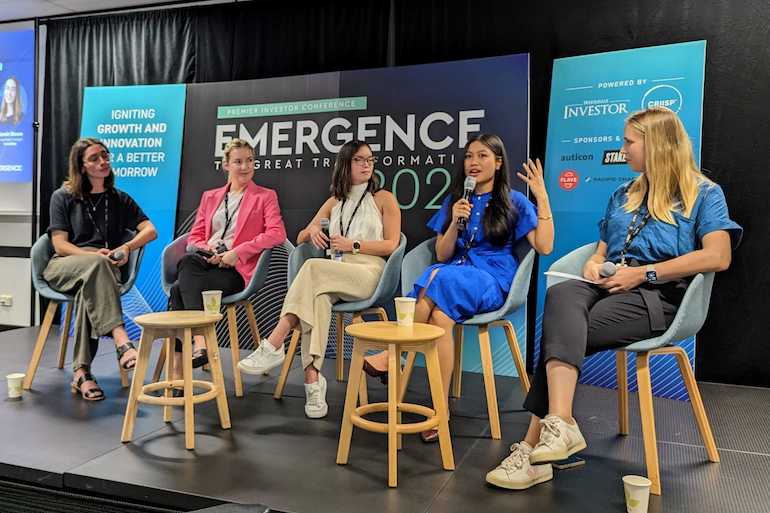Aside from questions on funding, there’s one other query that VCs seem to consistently field: How did you get into the venture capital industry?
Layoffs from the major technology companies has triggered renewed interest in VC as a career path. With the sector’s strong push towards impact companies, there’s now a very real opportunity to help businesses that are solving the world’s most pressing problems, impacting their work in shaping the future.
Given the wide variety of people and backgrounds that end up in VC, there really isn’t one clear pathway in. So, what can you do to set yourself up for success?
At the recent Wholesale Investor Emergence conference, I chatted with four amazing Australian VCs – Ada Yin from AirTree, Sarah Moore from Investible, Pearl Paguio from Carthona Capital and Georgina Healy from x15ventures – about their journey in the industry.
Here are my key takeaways.
1. Identify your ‘why’
Sure, it’s a ‘cool’ industry, but what about it actually gets your blood pumping? Why this particular fund?
Is it your obsession with B2B SaaS, your passion for climate tech, or your lived experience with the impact healthtech can have on people’s lives?
Homing in on your personal north star and the values you would bring to a fund will help you articulate your unique value proposition when breaking into what can be a competitive, fast paced industry.
Having a strong focus will also help in a role with constant context switching and ambiguity baked in.
2. Embrace and re-learn genuine curiosity
As we grow up, we often lose the childhood instinct for curiosity about the world around us, and the pressure to be an expert sees us disconnect from the concept of ‘beginner’s mind’.
In order to be a good VC, you have to be constantly open to learning new things and challenging your beliefs.
Your likelihood of identifying a successful business is impacted by how genuinely open you are to learning about new industries, the drivers of successful early stage businesses, and the challenges founders face.
While people often think that being in VC is about ‘asking the right questions’, there are often no ‘right questions’ – only whatever it is you and your team decide you need to know to gain conviction at an early stage.
3. Figure out where you add value
VC teams are often very small, with everyone bearing a significant amount of responsibility for the team’s successful functioning.
These teams are often built on complementary skill sets – so what is the unique thing you offer?
Is it a passion for climate-focused deeptech, experience founding your own startup, or the fact that you’re the resident FITS (Freak In The Spreadsheets)?
Ask yourself: given my background and experiences, what unique insight into certain opportunities do I have that could lead to outsized returns?
5. Build genuine relationships
As a VC, you’ll need to build strong relationships with entrepreneurs, other investors, and industry leaders. This means networking, attending conferences, and building your own personal brand.
People take different approaches towards this, but if you want to play the long game, we always recommend being kind and helping others.
When you share resources and add value where it is unexpected, you become the connective tissue that brings people and communities together.
Building or contributing to networks of people who care about things you care about is a great way to make a meaningful, positive impact.
5. Be the change you want to see in the VC world
Do you care deeply about addressing the biodiversity crisis? Apply to funds with a biodiversity mandate.
Want to work for a big name or corporate VC, but wish they did more to support diverse founders? Demonstrate how you could help them address this gap by your unique connection to founders from underserved backgrounds.
Capital allocators play a critical role in building the future, so it’s important to know what you stand for and advocate for investing in that future.
Where to next?
With all this in mind, if you’re looking for opportunities to make an impact in the world of VC, Oliver Bazzani puts together a fortnightly roundup of jobs in the industry.
There are a few junior positions open at the moment, so the timing couldn’t be better.
You can also stay up to date with the funds you’re interested in by subscribing to newsletters like Giant Leap’s Small Steps, or other industry sector based newsletters like Climate Tech VC.
Or look out for podcasts like Hunter Watkins’ Abstraction, where he is currently exploring the topic of carbon.




















Trending
Daily startup news and insights, delivered to your inbox.